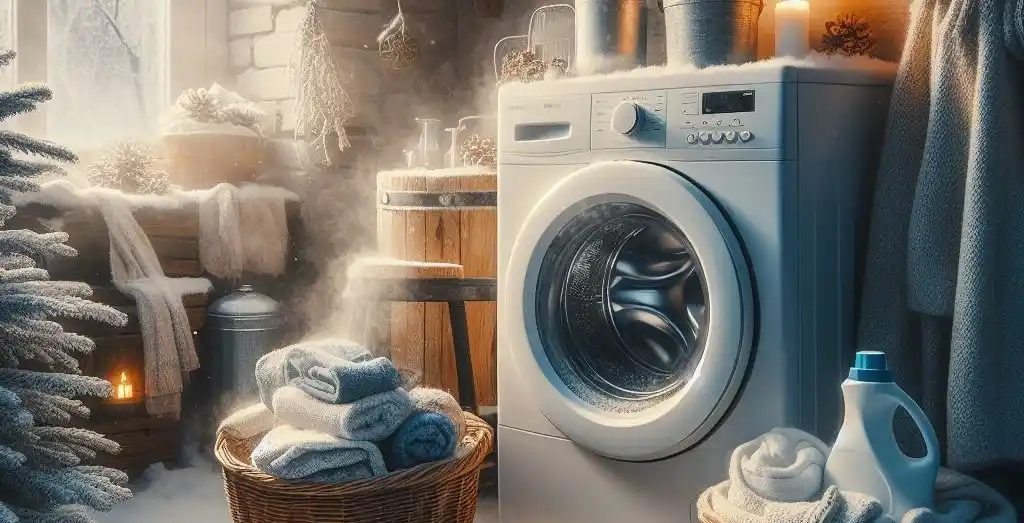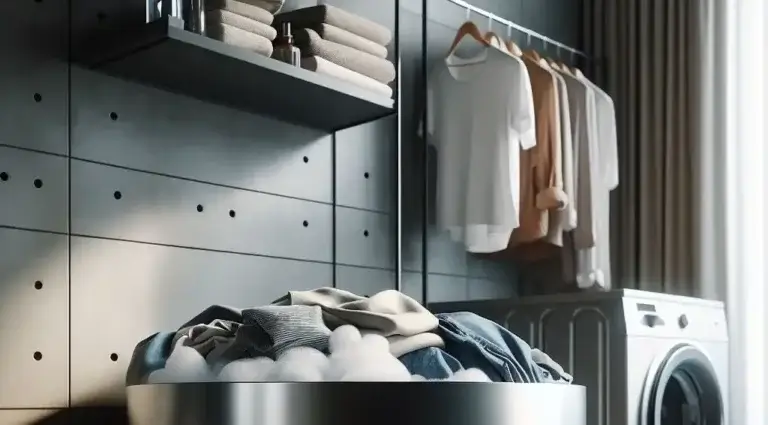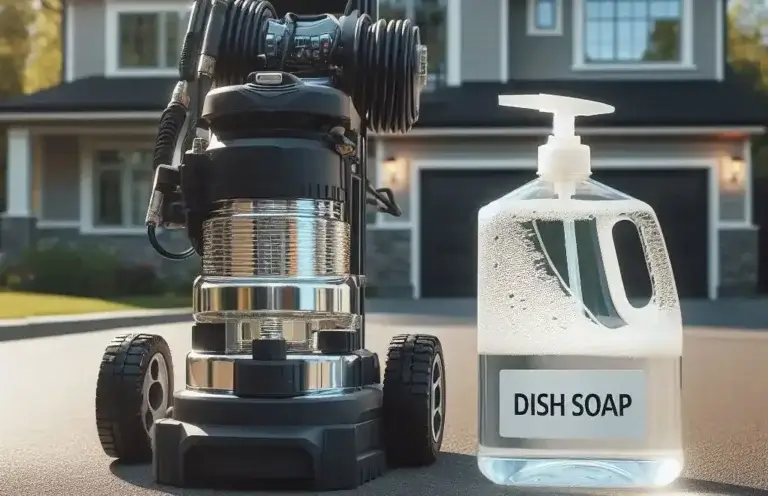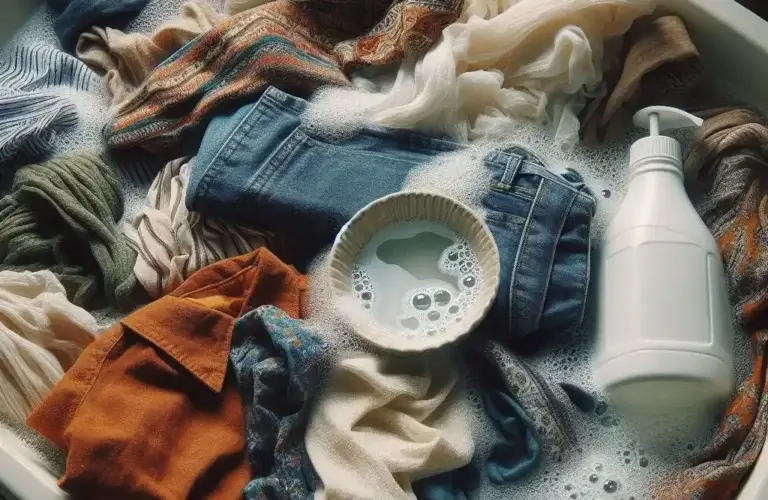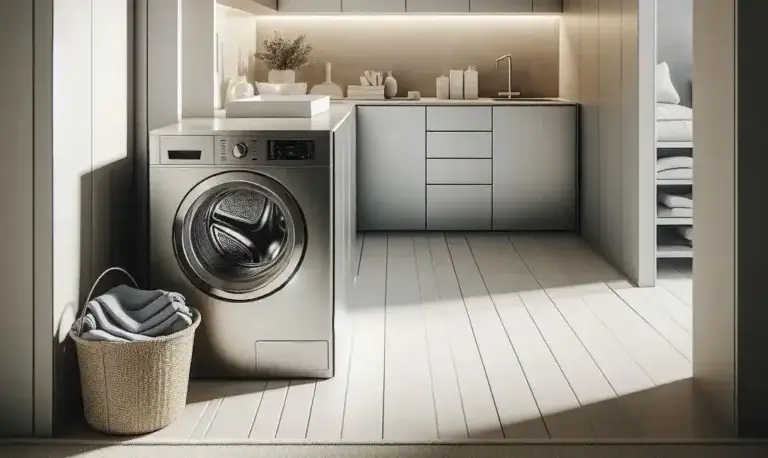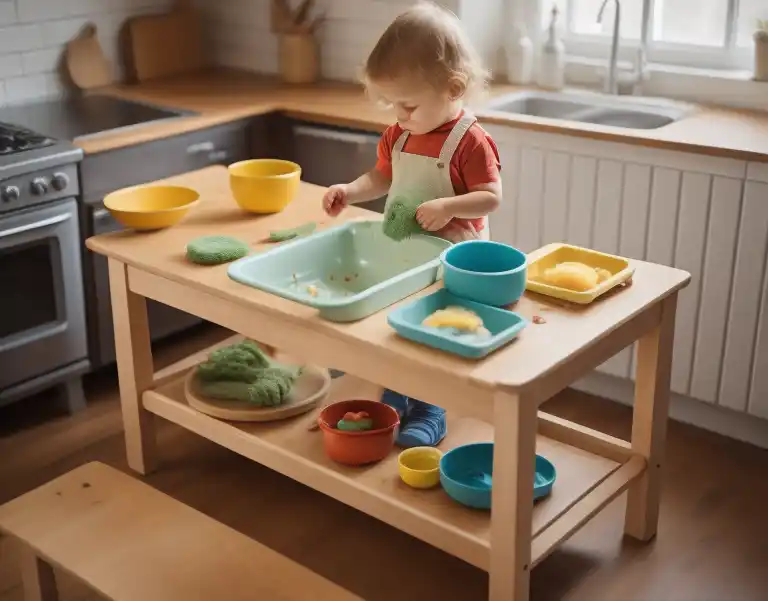Can I Wash Clothes During a Freeze? How Extreme Cold Temperatures Affect Your Appliances
Freezing temperatures can wreak havoc on homes and appliances. As the cold weather sets in, many homeowners wonder – can I still use my washing machine and dryer when it’s extremely cold outside?
Extreme cold poses some risks that you should be aware of before running a load of laundry when temperatures dip below freezing. In this article, we’ll explore can I wash clothes during a freeze and how freezing temperatures can affect washing machines, dryers, pipes, and other appliance parts. We’ll also provide tips to safely do laundry even when there’s ice and snow outside.
Table of Contents
How Does Freezing Weather Impact Washing Machines?
Washing machines contain both water lines and drain lines that can be vulnerable when temperatures are below freezing. Here are some of the most common issues that can occur:
- Frozen pipes or water lines – Just like other pipes in your home, the water supply lines running to your washing machine can freeze. This blocks the flow of water into the washer.
- Damage to water intake valve – If the water in the valve or hose leading into the machine freezes, it can cause the water intake valve to break. This often leads to water damage as a result.
- Water pooling inside the machine – If water remains in the washer drum or pump when not in use, it can freeze during extreme cold weather. This leads to water pooling inside the machine instead of draining properly.
Many newer washing machines come with some freeze protection features such as self-draining pumps or heated water lines. However, most still warn against the use of below-freezing temperatures.
To prevent pipe damage, experts caution against using your washing machine once outdoor temperatures dip to 0° to -18° Celsius or below.
Can I Run My Dryer When It’s Freezing Cold Outside?
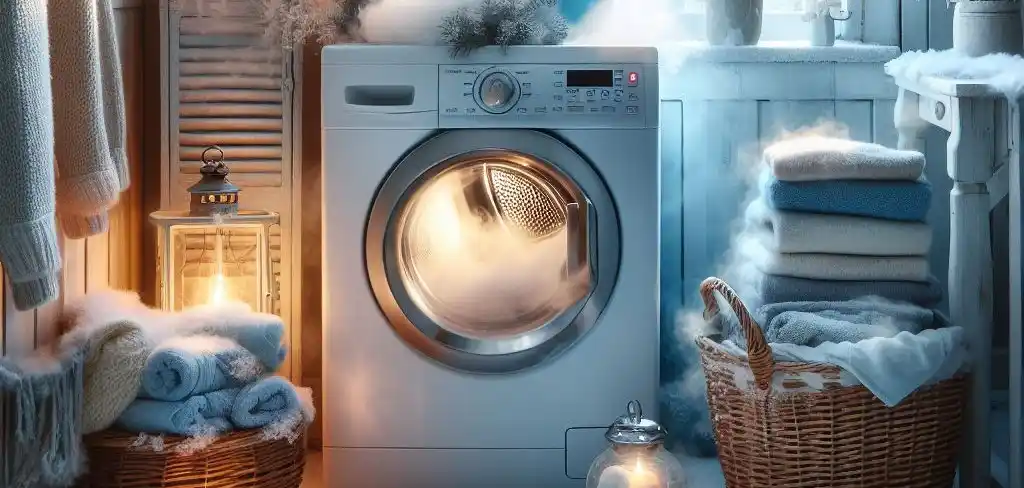
Dryers are often better equipped to handle freezing weather. However, there are still risks with both gas and electric dryers you should be aware of:
- Vent obstruction – The vent duct leading from your dryer to the outdoors can become blocked with snow or ice. This prevents proper airflow and can lead to overheating. Make sure to check your dryer vent opening after heavy snow or ice storms.
- Gas dryer issues – For gas dryers, issues typically occur on the gas line feeding the unit. Condensation build-up can freeze in the gas line and obstruct airflow. This can prevent the dryer from heating properly.
- Power outages – Both gas and electric dryers will not run at all without power. Make sure you don’t have wet clothes sitting for long periods inside a dryer during power outages.
If your dryer is located in a particularly cold basement or garage, the unit may struggle to maintain the proper operating temperatures needed during extreme cold spells.
How Does Freezing Weather Impact Water Pipes?
In addition to appliance damage, bursting pipes are one of the most common issues homeowners face during winter months. Prolonged exposure to freezing temperatures can cause pipes to freeze and rupture. Here are some of the biggest pipe freeze risks:
- Pipes located on exterior walls – Any pipes located along exterior facing walls have the highest risk of freezing since these walls are directly exposed to the frigid temperatures outside.
- Water supply shut-off valves – Shut-off valves are often located in cabinets along exterior walls. The confined space can lead to freezing.
- Pipes in unheated indoor locations – Pipes running through unheated garages, basements, attics, and crawl spaces are very vulnerable if freezing temperatures dip indoors.
Burst pipes can unleash hundreds of gallons of water per hour onto your floors and walls. This leads to massive water damage throughout the home. Flooding can also damage your walls, flooring, furniture, and more if left unchecked.
Can I Prevent My Pipes & Appliances From Freezing?
Luckily there are steps you can take to winterize both your appliances and pipes against freeze damage during extreme cold spells:
- Insulate pipes – Encase pipes located along exterior walls or in unheated areas with pipe insulation to help prevent freezing. Sealing air leaks along windows and doors also helps stop cold air from reaching your pipes.
- Shut off outdoor faucets/spigots – Any outdoor faucets should have their shut-off valves located indoors turned off. You should also drain any excess water from outdoor faucet pipes.
- Open indoor faucets – Allow both hot and cold water faucets located along exterior walls to slowly drip during extreme cold. Keeping water flowing within the pipes helps prevent freezing.
- Consider a freeze-proof outdoor faucet – If dealing with dripping indoor faucets is troublesome, consider upgrading to freeze-proof outdoor faucets. These contain built-in valves that shut off the water flow inside your warmer interior wall space, not outside.
- Insulate your water heater – Your water heater tank and pipes should be insulated per the manufacturer’s recommendations. This helps modulate temperatures.
- Consider installing heat tape/heat cables – Special heat tapes or cables wrap around pipework and then plug into an outlet to maintain a temperature warm enough to avoid freezing solid.
- Let faucets drip during extreme cold – Keeping both hot and cold water faucets dripping slightly during freezing weather keeps water flowing within the pipes and lessens freeze risk. The slight trickle also relieves pressure buildup from any ice expansion.
- Keep garage doors closed – Make sure garage doors remain closed during cold spells to protect pipes running through this area.
- Open cabinet doors – Pipes located within cabinets against exterior walls are more prone to freezing. Keep these cabinet doors open to allow indoor air to circulate and warm pipes during extreme cold.
- Seal air leaks – Any air leaks along exterior doors, windows, pipes or wiring holes can allow cold air to penetrate indoors and freeze pipes. Make sure to plug these gaps.
- Insulate your attic – Warm air rising into your attic can melt snow resting on the roof above. This melted water can then freeze in uninsulated attic spaces and cause ice dams along the roofline or frozen pipes. Make sure to have adequate attic insulation.
- Consider a freeze alarm – Special freeze alarms can be mounted along pipes and emit an audible warning tone when temperatures dip below freezing. This alerts homeowners to take preventative action like dripping faucets before pipes can burst.
Tips for Safely Using Appliances During Freezing Weather
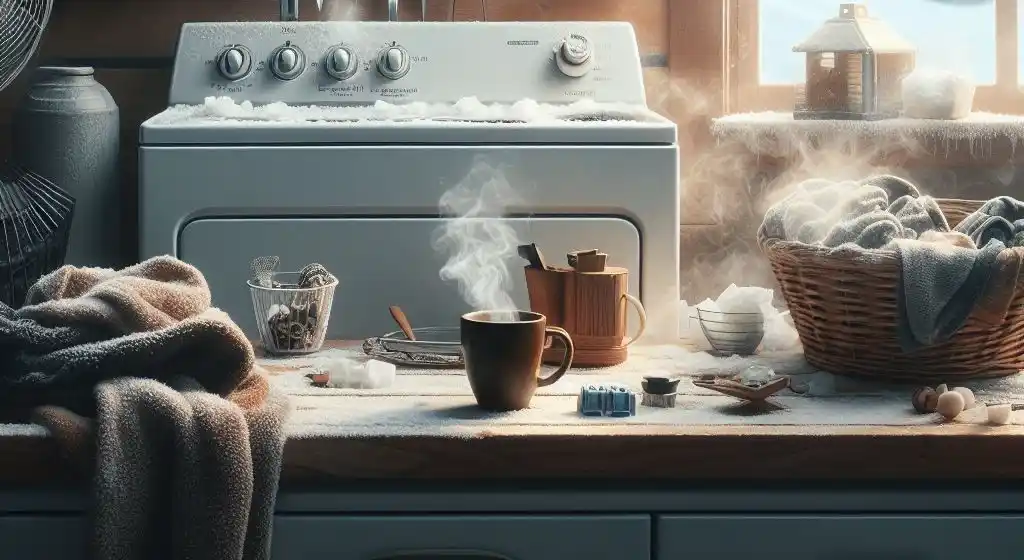
If temperatures are frigid outside, here are some tips to safely run your washer, dryer, and other appliances without issue:
- Only wash full loads – Run your dishwasher and washing machine only when full. This allows enough warm water to flow through and prevent freezing. Partially full wash cycles may not dispense enough warm water volume to keep appliance water lines from freezing.
- Keep appliances interior – Any appliances containing water lines should be located interior to your home insulation envelope and kept out of unheated spaces like garages or basements during extreme cold spells.
- Consider relocating appliances along exterior walls – For optimum freeze prevention, relocate washing machines and other water-fed appliances away from poorly insulated exterior walls in your home. Instead, install them along warmer interior walls less prone to freezing issues.
- Check appliances for pooled water – Scan under and around appliances like your refrigerator, washing machine, and dishwasher to make sure no water is pooling around units. Use towels to soak up minor pooling. For larger appliance leaks, contact an appliance repair expert.
- Turn off and drain ice makers – Many modern refrigerators contain ice maker features that continue running even during power outages. Make sure to turn off the ice maker and fully drain any leftover water from supply lines if prolonged subfreezing temperatures occur to avoid frozen and burst water lines.
- Avoid using pool features – For smart washing machines or other laundry appliances offering pool/tub soak features, avoid using these cycles during freezing weather. The static water could freeze within pipes causing rupture damage.
- Check dryer vents often – After heavy snowstorms or periods of high winds make sure to check your dryer vent hood outdoors. Remove any packed snow or ice blocking the vent opening to allow proper hot air and moisture dissipation while running loads.
- Consider draining washing machines – If your washing machine is located along poorly insulated exterior walls and you’ll be away from home for long periods during extreme cold spells, consider shutting off water supply lines and draining any residual water from hoses using compressed air to avoid bursts.
- Run portable space heaters near appliances – For vulnerable washing machines or burst-prone pipes located in frequently cold basements or garages, consider positioning a portable electric space heater nearby to warm the surrounding air temperatures. Use safe operating practices with the space heater and avoid leaving on unattended.
- Prepare an emergency water shut-off plan – Label or arrange water shut-off valves so they are easy to access within vulnerable areas. Make sure everyone in your home knows their location in case pipes burst and emergency shut-off becomes needed.
What Should I Do If My Pipes Freeze or Burst?
If despite preventative measures you experience frozen appliances or burst pipes from freezing temperatures:
- Turn off the water at your home shut-off valve immediately – This will prevent additional flooding once the pipes thaw. Leave any faucets open to allow pipes to safely drain.
- Draw cold water slowly from faucets – If your water pipes freeze but don’t burst, try drawing water slowly from both cold and then hot water taps nearest the suspected freeze. The steady pressure can help break up the ice blockage gently without additional pipe damage.
- Use a hairdryer or space heater to thaw pipes – Focus gentle heat application on the section of frozen water pipe to encourage gradual thawing. Be careful to not overheat pipes and avoid open flame devices.
- Never leave appliance water lines frozen for prolonged periods – If your washing machine or dishwasher contains frozen water pipes or valves, make sure to fully thaw the appliance before the next use. Leaving them frozen solid for weeks on end poses risks of serious damage upon restarting.
- Consult water cleanup and appliance repair experts immediately – For serious home water damage from burst pipes or broken appliance valves, contact both water/flood remediation and appliance repair experts right away. This helps secure your property against further damage and restore broken units. Document all damage thoroughly for insurance claims.
Extreme freezing temperatures can wreak havoc but don’t necessarily mean you can’t run vital appliances. With some preventative care and extra vigilance when operating washers, dryers, and more during freezing weather, you can avoid extensive home and appliance damage this winter. Just make sure to take appropriate caution if Old Man Winter comes to town!
Can you do laundry during a freeze?
Yes, you can do laundry during a freeze but you need to take some extra precautions. Run only full loads so there is enough warm water flowing to prevent hoses and pipes from freezing. Let faucets drip to keep water moving through pipes. Insulate any water lines or appliances along exterior walls. Be prepared to thaw frozen pipes immediately. Avoid using specialty cycles that hold water in the machine. Overall it’s best to limit laundry use when temperatures drop far below freezing to prevent appliance damage.
Can I do laundry in freezing temperatures?
Doing laundry in freezing temperatures below 30°F is risky but possible if proper precautions are taken. Only wash full loads, insulate water lines, leave faucets dripping, and be ready to thaw pipes. Avoid cycles with extended water contact. Vent dryers properly and clear external vents of snow/ice buildup. Let faucets flow 10+ minutes before the wash to warm lines. Consider relocating units away from uninsulated exterior walls until temperatures rise. Limit use as much as possible when extreme cold hits.
Can you wash clothes during a freeze?
Washing clothes when temperatures are below freezing outside risks damage to hoses, valves, and pipes. But running full loads only, insulating lines, dripping faucets, and thoroughly thawing any frozen components before/after use allow limited emergency laundry cycles. Just ensure to shut off and drain washing machines along exterior walls before vacating homes for winter to avoid burst pipes and major appliance damage during extreme cold spells.
Can you wash clothes when it’s below freezing?
It’s not recommended, but possible if essential. Insulate pipes, open indoor faucets to a trickle, run full loads only, avoid water-holding cycles, and promptly thaw any frozen lines before restarting the washer. Prevent pooled water around the unit’s base with towels to limit ice expansion damage. Routine winter laundry increases the chances of burst hoses and valve cracks over time though, so limit it to emergency use until temperatures climb above freezing again.
Is it ok to do laundry in freezing weather?
Doing small emergency laundry loads is possible in freezing weather with care taken to prevent pipe and appliance damage. But for most homes, running washers below 30°F risk burst pipes, broken wash valves, frozen drainage lines, and excess strain on systems not designed for icy slush intake. Insulate, thaw lines thoroughly, catch leaks quickly, and redirect water away from your home’s foundation. Whenever possible, wait until the weather warms to resume laundry routines. One burst pipe can cause thousands in flooding damage rapidly.
FAQs: Operating Appliances & Doing Laundry During Freezing Temperatures
Q: Will my washing machine break if I use it when it’s below freezing outside?
A: Possibly. Most washing machine manufacturers caution against use once outdoor temperatures dip below freezing. The repeated water intake combined with freezing temps can damage hoses and valves over time. Make sure to insulate nearby water pipes to prevent burst damage.
Q: Why does my washing machine have an “LF” error code?
A: This typically indicates the washer is not able to fill appropriately with water during the cycle, often from frozen household water pipes. Thawing pipes and restoring proper home water pressure normally clears an LF error washing machine issue.
Q: Do I still need to vent my dryer outdoors even in freezing weather?
A: Yes. Moisture-laden air expelled from dryers needs to vent fully outside your home even during winter. Make sure to clear ice and snow buildup around your dryer vent cap regularly to prevent moisture from re-entering your home and causing indoor mold growth issues.
Q: My clothes feel stiff and rough after washing in cold weather. What can I do?
A: Try allowing your faucets and washing machine water lines to warm up for 10-20 minutes with the water running before adding your laundry. The heated water prevents detergent clumping. Adding vinegar to the wash and an extra rinse cycle also helps restore softness to fabrics.
Q: Why does my washing machine make loud noises during winter?
A: The rapid heating and cooling cycles common during winter can make washing machine parts expand and contract. This causes banging or knocking noises. Make sure to evenly distribute the load around the drum and use cold wash cycles during freezing weather to reduce sound issues.
Q: Why won’t my washing machine drain the water out after the wash cycle when it’s cold?
A: Frozen drain pipes or clogged mini-ducts on exterior venting can prevent proper drainage. Use a hair dryer to thaw drainage pipes fully before and after use to restore proper water flow. Avoid overloaded wash drum volumes as well. The excess strain can impede winter drainage.
Q: Are front-loading washers better than top loaders for winter use?
A: Yes – most experts recommend front-loading washing machines for flawless function during freezing weather. Front-load washers better seal in warm interior air to help prevent ice blockages. The pull-open doors also eliminate bulky top lids that allow cold air intrusion from above.
Final Tips for Safely Using Home Appliances in Freezing Weather
- Drain and tightly seal any exterior appliance pipes and faucets before leaving homes vacant over winter
- Maintain constant heating levels even while away to keep indoor ambient temperatures warmer – do not allow your thermostat to dip significantly
- Consider placing sanitary absorbent materials under washing machines and other water-fed appliances to catch minor dripping from cold temperatures
- Have any leaks, or drips near electrical outlets/appliances repaired quickly before major damage develops
- Keep gutters cleared to avoid ice dams pooling on your roofline and backing up under shingles where appliance vents terminate through the attic
- Always follow manufacturer instructions for winter appliance operation and care
Hopefully, this advice helps you safely run all your home essential appliances even as Old Man Winter rages outside. Stay warm and prevent any frozen pipe disasters or appliance damage this season!

